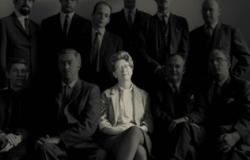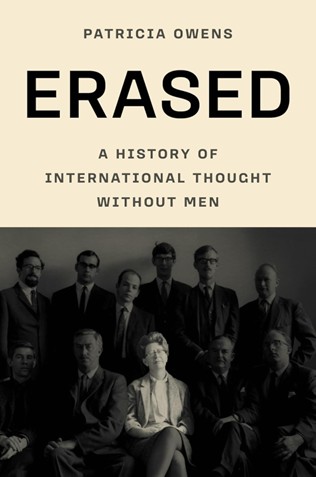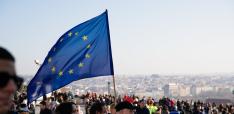Book Review - Erased: A History of International Thought Without Men

Erased: A History of International Thought Without Men, by Patricia Owens. Princeton: Princeton University Press, 2025. 432 pp., £30 hardcover 9780691266442, e-book 9780691266824
Patricia Owens’ careful study of the women who were instrumental in the creation of the discipline of International Relations is a real tour de force. Not only is it an important historical work and genealogy on the history and idea of International Relations that challenges conceptions as to what the discipline is, but it is a page turner. Owens weaves together the life stories and intellectual contributions of a significant cohort of eighteen women who were instrumental in the creation of the teaching and study of international relations, beginning with Lucie Zimmern in Aberystwyth in 1909 and culminating with Susan Strange the LSE Montague Burton Chair of ten years (1978-1988). As Owens puts it, they were there from the beginning notably in the UK’s foremost institutions yet their intellectual work, their influence and public recognition were devalued, ignored and erased (Owens, 2025: 2). The book also relates the stories of the institutions, the universities, Chairs, funding bodies, think tanks, coordinating committees and professional associations that form the infrastructure and spaces in which International Relations developed.
 This is not just a book about recovering women who were erased from the study and teaching of the discipline. It is about the politics of defining the discipline, how this produced gendered and racialised exclusions and elided the most pressing question of our time which, in Owens’ terms, is ‘the reckoning and non-reckoning with empire’. This book shows how the discipline evolved from about 1909 to the end of the 20th century through the scholarly work of a cohort of women, who were subsequently erased as the boundaries of the discipline were redefined to exclude IR’s constituent disciplines in which many of these women were trained. Yet these exclusions were not simply the result of a redefinition of IR that sought to distinguish itself from history; they were a result of misogyny and racism that were pervasive in the institutions that supported IR including ‘Chatham House, the British Coordinating Committee for International Studies, … the Department of International … Relations at the LSE, … and the British Committee on the Theory of International Politics. The redefinition of the discipline allowed it to effect such exclusions’ (Owens: 11). The work of the historian here has been not only to uncover the debates surrounding this redefinition and to show how this context impacted and impoverished the discipline. But it is also to recover a history of international thought produced by women in and out of the academy who engaged with the most pressing issues of the time concerning world politics, that is to say empire and race.
This is not just a book about recovering women who were erased from the study and teaching of the discipline. It is about the politics of defining the discipline, how this produced gendered and racialised exclusions and elided the most pressing question of our time which, in Owens’ terms, is ‘the reckoning and non-reckoning with empire’. This book shows how the discipline evolved from about 1909 to the end of the 20th century through the scholarly work of a cohort of women, who were subsequently erased as the boundaries of the discipline were redefined to exclude IR’s constituent disciplines in which many of these women were trained. Yet these exclusions were not simply the result of a redefinition of IR that sought to distinguish itself from history; they were a result of misogyny and racism that were pervasive in the institutions that supported IR including ‘Chatham House, the British Coordinating Committee for International Studies, … the Department of International … Relations at the LSE, … and the British Committee on the Theory of International Politics. The redefinition of the discipline allowed it to effect such exclusions’ (Owens: 11). The work of the historian here has been not only to uncover the debates surrounding this redefinition and to show how this context impacted and impoverished the discipline. But it is also to recover a history of international thought produced by women in and out of the academy who engaged with the most pressing issues of the time concerning world politics, that is to say empire and race.
A critical thread running throughout the book is about what International Relations is and how its broadly accepted redefinition and practice impoverished the study as well as elided the central questions of empire, colonialism, decolonisation, freedom, equality and race, at a time when the collapse of empire entailed the creation of a new global order, new accounts of world history and reimaginings of the future of a non-imperial world order. On the one hand, there were those who saw IR as a study that drew on constituent disciplines including history, law, anthropology, the classics, political theory and so on. In this conception, IR comprised an interdisciplinary field rich in methodologies for understanding and critically analysing (major phenomena of) world politics. On the other hand, there were those – notably Charles Manning – who sought to distinguish IR from these disciplines, notably from history, and to think of it as a meta-discipline in which IR scholars, literally conceptualised as ‘Supermen’, would ‘dabble’ in a variety of fields and specialise in a sociological conception of the ‘international’ supported by a racialised conception of ‘international society’ or a ‘society of states’ (Owens: 104, 6). In turn, this led to the development of the English School, the view that the study of IR ought to focus on grand theories such as realism, liberalism, Marxism, constructivism, feminism, poststructuralism and postcolonialism (Owens: 294) and a by and large all-white, all male canon.
These competing conceptions of IR were drawn (more or less) on gendered and racialised lines. Manning pursued his project to distinguish IR from history in collaboration with other male scholars and through his position at the LSE and in the British Coordinating Committee for International Studies. Owens underlines that the project for a ‘separate IR was deeply ideological, defined against multiple feminised, racialised and methodological Others’ (Owens: 294). Others that her book brings once again to the public fore, demonstrating the profound influence that women had on not only the discipline but broader public debates about empire, race, anticolonialism, decolonisation, post-imperialism, multi-racial Britain and so on. Many of the women studied held opposing politics and ideas such as Margery Perham and Claudia Jones; yet they addressed questions about empire and race as central to their studies and to the world they inhabited.
Each chapter of the book both examines the lives of one or two women and outlines a detailed and informative analysis of their thought. As such it demonstrates how these were deeply intertwined and how the personal impacted their professional lives, notably with regard to financial (in)stability, and their relationship with men intellectually and intimately. The beauty of Owen’s book is that it takes us through this story of the development of IR and situates the work of her cohort of women within the context of the shifting discipline but also within that of the changing world order. Her study examines the writings of women such as Eileen Power and Margery Perham, both of whom were well known writers and public figures at the height of their careers but who today in the contemporary teaching, canon and study of IR have been erased. Of interest is Perham whose pro-imperialist views had to adapt to the changing world order and whose work reconsidered Britain’s place in a decolonising world, even if she maintained a chauvinistic or neo-colonial attitude. Perham is introduced early in the book when Britain is still an empire and then she reappears as the empire decolonises; as such it succeeds in capturing the evolution of Perham’s thinking and career that followed the changing events of the world.
The book is very well structured as a chronological history that brings to bear many contradictions within each person’s thinking and life path as well as within our own expectations that women who were trailblazers in our field, written out of it and recovered, would somehow be radical and heroic when they were simply very good scholars whose political perspectives did not necessarily go against the current. Rather they were women engaged in what they did, engaged in their research, writing and teaching. The reader is invited as such to question their own ideas and understandings of the discipline and to think them anew. To be sure, Owens does examine the ideas of radical women thinkers, such as Claudia Jones and Merze Tate who brought the Black Atlantic tradition to the fore and had major impact beyond the discipline, in the real world through their resistance to coloniality and racism.
Of great interest in the book is the manner in which Owens recounts the personal, intimate, academic, intellectual lives and positionalities of her cohort and stresses that these are intertwined and inseparable. For instance, there is a section entitled ‘Margery Perham and her Motorbike’ (Owens: 48) another on ‘Merze Tate and her Bicycle’, and on her race and sorority (Owens: 144, 139). The book draws attention to how these women ‘performed and expressed gender in opposition to, resistance to and complicitly in patriarchal and class structures’ (Owens: 8) and their roles drawing more complex, more dimensioned and human portraits of them. To be sure, Owens’ depiction of these scholars draws a sharp contrast to Mannings’ supermen ideal and to the notion of male objectivity (Haraway, 1988; Collins, 1994). The anecdotes demonstrate power relations and the manner in which power operates. As such, they underscore the central aim of the book which is to show how patriarchal power has been used to erase the voices of women and how everyday tactics have contributed to this. Owens demonstrates that erasure occurs in the misogynistic relations between scholars where women’s work is often considered not good enough yet appropriated by male colleagues, or they are judged for not publishing enough without taking into account heavy teaching loads, the fair distribution of labour, and its impact on mental health, or they are subject to sexual and gender-based harassment and/or violence, or they are excluded for having too many children as the great Susan Strange was when she was pushed out of UCL for having 6 children. Unfortunately, today this is still an all too familiar story and these inequalities remain embedded in disciplinary and institutional structures. Recent reports published by the Academy of Social Sciences and the British Academy[1] based on HESA data show that in the UK, there are slightly more women studying politics than men. Although the gap is closing, more men than women teach Politics and IR (41% are women and 59% are men). Moreover, there are more men than women in senior roles (68% of professors are men compared to 32% women).[2] These hierarchies persist notably in a sector where many women and women of colour are on multiple casualised contracts, making it very difficult (almost impossible) for them to publish and get a regular job without great personal sacrifice. Uncovering the history of some of these issues that we continue to confront helps to understand and make change, but it is often slow.
The recovery of these women scholars entailed excavating the archival records of these women and their teaching as well as reading and interpreting their scholarly work. The work that has gone into this book is monumental. It demonstrates a meticulous and careful reading and piecing together of a history of the discipline that shows the connections between all the characters discussed in the book and builds a coherent story to then show where IR stands today. It admirably combines contemporary scholarship on the question of the pitfalls of IR, indeed its failure, as an intellectual project. Owens sheds light on both what is at stake and what the state of the discipline is currently, and how I think that the elision of some of the major issues confronting the world have contributed to our present predicament and a global populism characterised by misogyny and racism. Again, this book is not simply about recovering these women as scholars who deserve to be studied in a manner that goes beyond the canon, which begs the question as to whether or not disciplines ought to be constructed on the basis of a ‘canon’, but it is also about the misogyny and racism within the academy and within the construction of canons. In other words, this is not simply a history for history’s sake. This begs the question on the state of the discipline today and the persistent nearsighted reproduction of international political thought by men, of men, for men. In 2022, the new LSE press published a book that puts forward a set of all-male paradigmatic thinkers from antiquity to the present to analyse how ‘we think about and frame political action and agency’ in order to address the present challenges of politics including crisis and conflict (Kelly, 2022: 1-4). This book examines international thought and justifies its reproduction of an all-male canon on the assumptions that there is no canon of women thinkers in international political thought, and that feminist theory is a second order theory because it is mainly critical theory (Kelly: 20-21). Neither Lucie Zimmern nor Margery Perham nor Susan Strange are included in the bibliography. Patricia Owens’ book challenges epistemologies of ignorance and neglect not simply by bringing to light the many women whose thought and ideas have shaped international political thought and IR, but by reclaiming and resetting the discipline as an interdisciplinary study and activity that draws on the methodologies of its constituent disciplines including archival research, interviews and ethnography. As Owens herself does in her extensively, meticulously researched and brilliantly constructed book.
Dr. Manjeet Ramgotra is Senior Lecturer in Political Theory in the Department of Politics and International Studies at SOAS University of London. She works on republicanism in the history of ideas and has recently co-edited Rethinking Political Thinkers (OUP, 2025). Email: Mr18@soas.ac.uk.
Notes
[1] Academy of Social Sciences, ‘Equality, Diversity and Inclusion (EDI) in the social sciences: summary data report (UKRI: March 2024); Connor Mckenzie, Paolo Roblero, and Sharaiz Asin, ‘Politics and International Relations provision in UK higher education’ (The British Academy, January 2025).
[2] Academy of Social Sciences, ‘Equality, Diversity and Inclusion (EDI) in the social sciences: summary data report: 28-29; ‘Politics and International Relations provision in UK higher education’: 53-54.
References
Collins, Patricia Hill (1994). ‘The Social Construction of Black Feminist Thought’. In Mary Evans, Ed. The Woman Question. London: Sage Publications, second edition. Pp. 82-103.
Haraway, Donna (1988). ‘Situated Knowledges: The Science Question in Feminism and the Privilege of Partial Perspective’. Feminist Studies. 14: 3. Pp. 575-599.
Kelly, Paul. (2022) Conflict, war and revolution: The problem of politics in international political thought. London: LSE Press. DOI: https://doi.org/10.31389/lsepress.cwr.
Owens, Patricia (2025). Erased: A History of International Thought Without Men. Princeton University Press.


